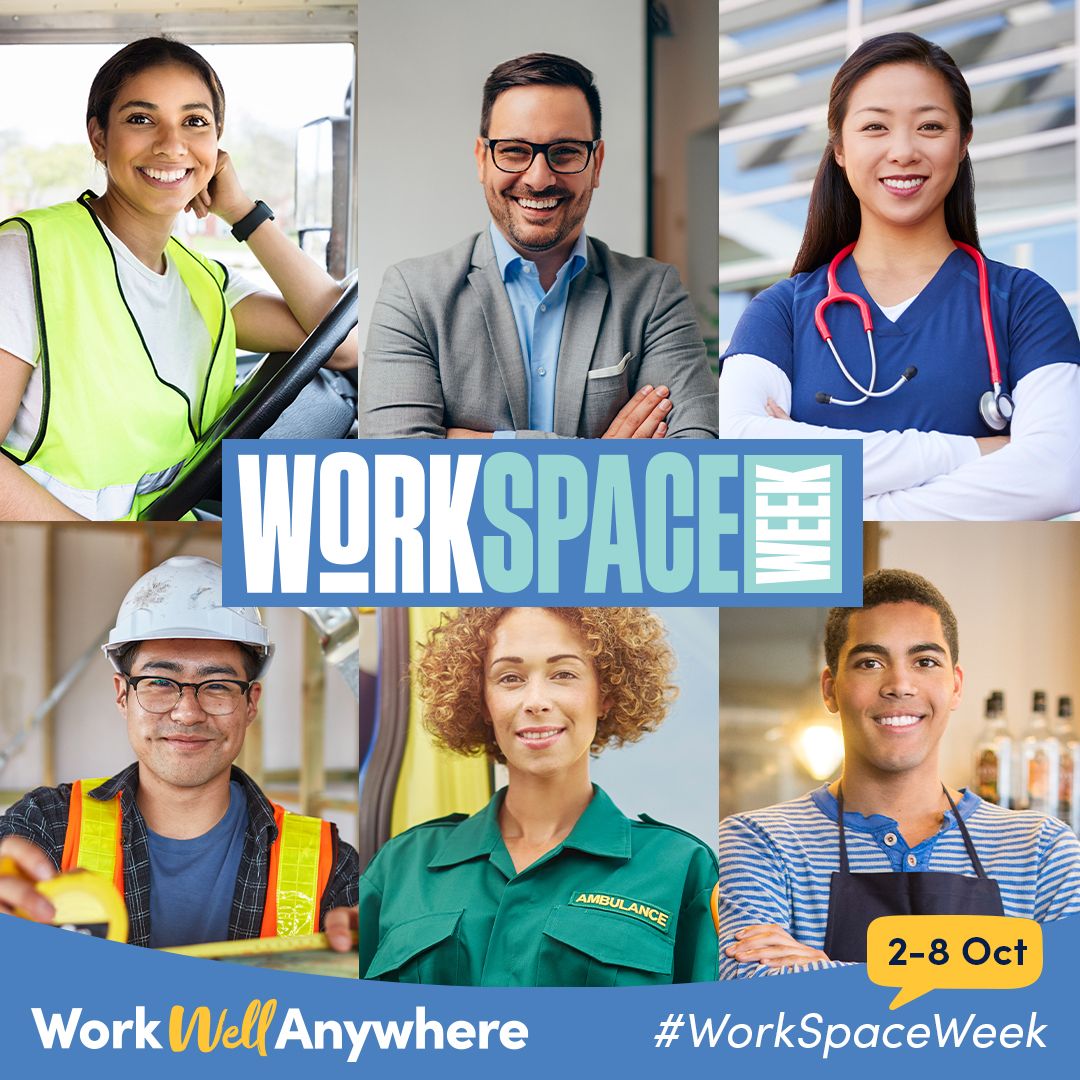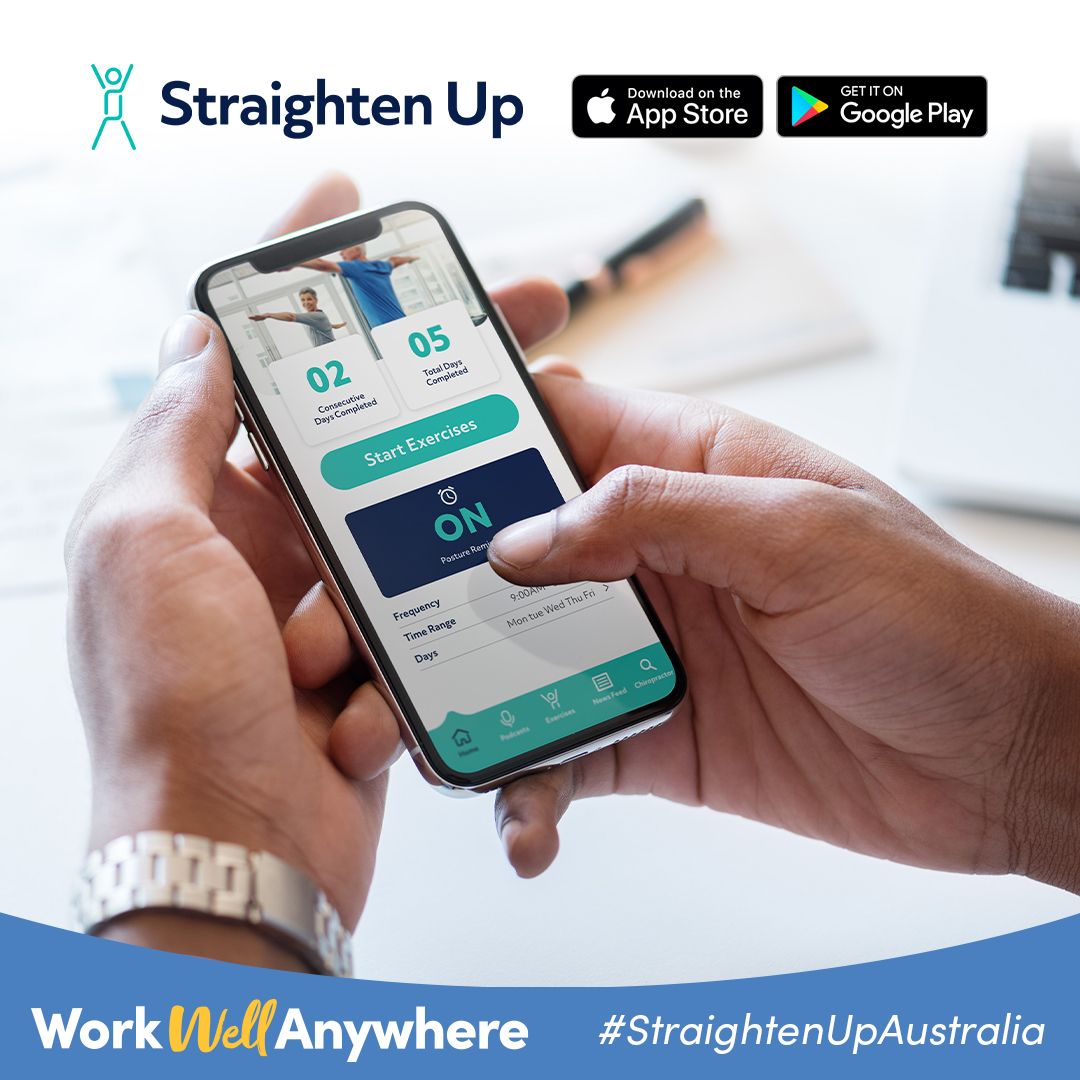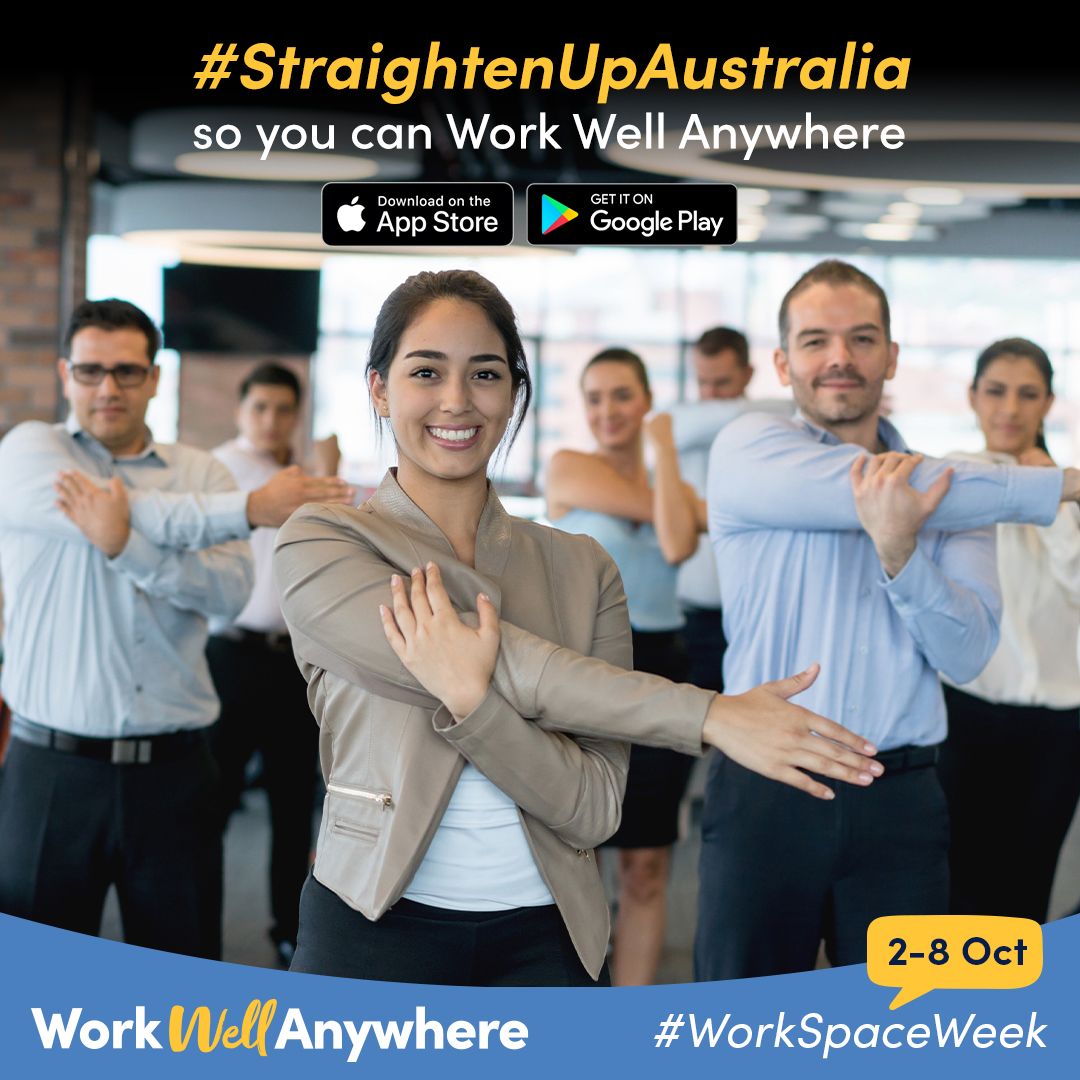Trending...
- California: Governor Newsom, Superintendent Thurmond announce over $618 million to support another 458 community schools
- $4.3 Million Patent Application Waiver Fee Granted by FDA on New Drug Application Fee for Treatment Addressing Suicidal Depression & PTSD: NRX Pharma
- xREnergy up as much as +3,094,634% on first day listed on the XRP Ledger. Ticker : $XRE
SYDNEY - Californer -- Today, the Australian Chiropractors Association (ACA) launched WorkSpace Week (2-8 October 2023) with the release of new data revealing the high incidences of work-related musculoskeletal disorders (WMSD) in Australia and their impact on workers and have issued a warning for those most at risk of workspace spine-related injuries.
WorkSpace Week is an initiative of the Australian Chiropractors Association (ACA), dedicated to minimising workspace WMSDs which are Australia's leading work health and safety concern costing the economy over $55 billion annually through direct health costs, lost productivity and reduced quality of life of sufferers.
In launching the national campaign on Labour Day (NSW, SA and ACT) to kick off national Safe Work Month, Dr David Cahill, President of the ACA said, "Through WorkSpace Week our aim is to help prevent the incidences of work-related musculoskeletal disorders (WMSDs) by educating Australians about workspace risks and strategies to prevent WMSDs from jobs known to pose a high risk to workers.
"According to the World Health Organisation (WHO, 2019), musculoskeletal conditions account for the greatest proportion of persistent pain conditions - the second largest contributor to disability world-wide with low back pain being the single leading cause of disability, globally.
"WMSDs are a range of inflammatory and degenerative conditions affecting the muscles, tendons, ligaments, joints, peripheral nerves and supporting blood vessels that may be caused by a single workspace event, but commonly result from repeated harmful workspace activities over an extended period of time," Dr Cahill said.
"Reducing the incidences of WMSDs and minimising their impact through prevention, early diagnosis and effective treatments should be the first priority of both workers and employers alike," Dr Cahill said.
To better identify the prevalence of WMSDs and workers most at risk, ACA commissioned Pureprofile to conduct an independent survey of 1001 Australians nationally that revealed 87% currently have, or have experienced a WMSD that can also impact mental health leaving no doubt as to the enormous burden WMSDs have on Australians' spinal and mental health while costing the economy billions.
"Although body stressing is the most commonly reported cause of physical injury for serious workers compensation claims as a result of poorly executed lifting, pushing, pulling or bending; the survey revealed prolonged sitting, computer usage (in an office or at home) and repetitive movements at work can also lead to chronic neck and back pain if not prevented or treated when injuries first occur," Dr Cahill said.
More on The Californer
"With 87% of respondents reporting experiencing musculoskeletal pain or injury while at work or as a result of working, and 73% of sufferers experiencing 3 or more WMSDs, the most prevalent being low back pain (62%), neck pain (55%), mid back pain (53%) and tension/cervicogenic headaches (52%), the data demonstrates a significant need for employers and employees to practice preventative measures," he said.
"Considering the survey results and in light of the worldwide study led by the University of Sydney demonstrating low back pain is the most commonly recorded workspace injury; WorkSpace Week is aimed at prevention and early intervention of WMSDs caused by body stressing, repetitive work, poorly set up non-ergonomic workstations and mental stress," said Dr Cahill.
According to the Australian Bureau of Statistics (2021-22), those most vulnerable to WMSDs are community and personal service workers such as healthcare, aged care, NDIS and disability service workers; while machinery operators, drivers, labourers, technicians and tradies are also among those with the highest rates of physical work-related injuries.
However, the survey identified computer use as a leading cause of the top four WMSDs (low back, neck, mid back and tension/cervicogenic headaches) - the only trigger ranked first or second for 9 WMSDs with computer usage ranking as the third or fourth most common trigger for the remaining 3 WMSDs.
With 89% of workers who worked at a desk reporting that they suffered an WMSD (including those who do a combination of desk work with standing and/or physical work), and female desk workers reporting the highest incidence (91%) compared to men (76%); WMSD relating to computer use in non-ergonomic workspaces, poor posture and the lack of effective exercise programs to improve spinal health play a significant role in causing WMSDs.
"The survey also revealed that 84% of WMSD sufferers experienced work-related stress which can lead to tension and cervicogenic (neck related) headaches impacting workers' concentration, productivity, social engagement and their overall wellbeing and quality of life," said Dr Cahill.
With the Australian Therapeutic Goods Administration (TGA) announcing the reduction of paracetamol product pack size to address acknowledged risks of overuse (May 2023); and the University of Sydney Sydney's findings (June 2023) that opioids should not be recommended for acute neck or back pain as there's no benefit and there is a significant risk of long-term harm; it's vital people suffering from musculoskeletal disorders seek early treatment for spine-related conditions rather than depend on medications for pain relief.
More on The Californer
Studies have shown WMSDs caused by physical or mental stress respond well to early, effective chiropractic healthcare that treats the injury, not just the symptoms and can help prevent deterioration, improve recovery outcomes, reduce severity and help avert long-term implications including reliance on medications to manage chronic pain and depression.
Chiropractic healthcare plays a vital role in providing 350,000 non-surgical, drug-free chiropractic consultations every week for Australians. ACA chiropractors are Australia's leaders in providing a patient centred, multi-modal, therapeutic approach to improving the spinal health and overall wellbeing through proven relaxation methods and drug-free holistic healthcare that treats underlying conditions and not just the symptoms.
Anyone who undertakes repetitive actions, prolonged standing or sitting, lifting or pushing/pulling, computer use at home or the office, and those impacted by workplace stress can all suffer from a range of work-related spinal health issues including, back or neck pain and headaches that can develop into chronic pain.
Prevention is the best protection and there is much that can be done, so during National WorkSpace Week 2023 the ACA is focussed on preventing work-related spinal health disorders caused by physical and mental stress, repetitive work and poorly set up non-ergonomic workspaces to help minimise workspace injuries and the long-term impact on employers, the economy and the overall health and wellbeing of injured workers.
The ACA has developed free resources available at workspaceweek.org.au including the Ergonomic Checklist for computer users, My Healthy WorkSpace Stretching Poster and Factsheets for headache sufferers and workers who sit, lift, bend and stand for prolonged periods for display in workspaces. Workers can also listen to the Consult A Chiro Podcast to learn more about maintaining spinal health and download and use the free Straighten Up app, 'your pocket chiropractor' to help minimise WMSDs and maximise spinal health and well-being to improve productivity so all Australians can work well anywhere.
During WorkSpace Week, Australians are encouraged to host a #StraightenUpAustralia Challenge – a simple three-minute exercise activity using ACA's Straighten Up app in their workspace to promote working well anywhere and to share video and images of their #MyHealthyWorkspace.
WorkSpace Week is an initiative of the Australian Chiropractors Association (ACA), dedicated to minimising workspace WMSDs which are Australia's leading work health and safety concern costing the economy over $55 billion annually through direct health costs, lost productivity and reduced quality of life of sufferers.
In launching the national campaign on Labour Day (NSW, SA and ACT) to kick off national Safe Work Month, Dr David Cahill, President of the ACA said, "Through WorkSpace Week our aim is to help prevent the incidences of work-related musculoskeletal disorders (WMSDs) by educating Australians about workspace risks and strategies to prevent WMSDs from jobs known to pose a high risk to workers.
"According to the World Health Organisation (WHO, 2019), musculoskeletal conditions account for the greatest proportion of persistent pain conditions - the second largest contributor to disability world-wide with low back pain being the single leading cause of disability, globally.
"WMSDs are a range of inflammatory and degenerative conditions affecting the muscles, tendons, ligaments, joints, peripheral nerves and supporting blood vessels that may be caused by a single workspace event, but commonly result from repeated harmful workspace activities over an extended period of time," Dr Cahill said.
"Reducing the incidences of WMSDs and minimising their impact through prevention, early diagnosis and effective treatments should be the first priority of both workers and employers alike," Dr Cahill said.
To better identify the prevalence of WMSDs and workers most at risk, ACA commissioned Pureprofile to conduct an independent survey of 1001 Australians nationally that revealed 87% currently have, or have experienced a WMSD that can also impact mental health leaving no doubt as to the enormous burden WMSDs have on Australians' spinal and mental health while costing the economy billions.
"Although body stressing is the most commonly reported cause of physical injury for serious workers compensation claims as a result of poorly executed lifting, pushing, pulling or bending; the survey revealed prolonged sitting, computer usage (in an office or at home) and repetitive movements at work can also lead to chronic neck and back pain if not prevented or treated when injuries first occur," Dr Cahill said.
More on The Californer
- Bennett Awards Designs Two Cohesive Custom Awards for 2025 Sci-Tech Academy Awards
- Poll Finds Overwhelming Opposition to Keeping Big Cats as Pets
- SM Telecom Expands AT&T Partnership to Deliver Cutting-Edge 5G+ Wireless Solutions New Collab Brings AT&T's Advanced 5G+ Technology to Cellphone
- Governor Newsom proclaims Older Californians Month
- Groundbreaking Launches 154-Acre Los Cerritos Wetlands Restoration in Long Beach – Single Largest Increase in Open Space in Long Beach in Decades
"With 87% of respondents reporting experiencing musculoskeletal pain or injury while at work or as a result of working, and 73% of sufferers experiencing 3 or more WMSDs, the most prevalent being low back pain (62%), neck pain (55%), mid back pain (53%) and tension/cervicogenic headaches (52%), the data demonstrates a significant need for employers and employees to practice preventative measures," he said.
"Considering the survey results and in light of the worldwide study led by the University of Sydney demonstrating low back pain is the most commonly recorded workspace injury; WorkSpace Week is aimed at prevention and early intervention of WMSDs caused by body stressing, repetitive work, poorly set up non-ergonomic workstations and mental stress," said Dr Cahill.
According to the Australian Bureau of Statistics (2021-22), those most vulnerable to WMSDs are community and personal service workers such as healthcare, aged care, NDIS and disability service workers; while machinery operators, drivers, labourers, technicians and tradies are also among those with the highest rates of physical work-related injuries.
However, the survey identified computer use as a leading cause of the top four WMSDs (low back, neck, mid back and tension/cervicogenic headaches) - the only trigger ranked first or second for 9 WMSDs with computer usage ranking as the third or fourth most common trigger for the remaining 3 WMSDs.
With 89% of workers who worked at a desk reporting that they suffered an WMSD (including those who do a combination of desk work with standing and/or physical work), and female desk workers reporting the highest incidence (91%) compared to men (76%); WMSD relating to computer use in non-ergonomic workspaces, poor posture and the lack of effective exercise programs to improve spinal health play a significant role in causing WMSDs.
"The survey also revealed that 84% of WMSD sufferers experienced work-related stress which can lead to tension and cervicogenic (neck related) headaches impacting workers' concentration, productivity, social engagement and their overall wellbeing and quality of life," said Dr Cahill.
With the Australian Therapeutic Goods Administration (TGA) announcing the reduction of paracetamol product pack size to address acknowledged risks of overuse (May 2023); and the University of Sydney Sydney's findings (June 2023) that opioids should not be recommended for acute neck or back pain as there's no benefit and there is a significant risk of long-term harm; it's vital people suffering from musculoskeletal disorders seek early treatment for spine-related conditions rather than depend on medications for pain relief.
More on The Californer
- Don Barnhart Drops Unapologetically Hilarious Comedy Special "You Do You," On Open Bar Network
- Cygnet Theatre Announces The Cast and Creative Team of Rodgers and Hammerstein's Oklahoma!
- Shon Garage Door Repair Expands Trusted Services to San Diego, CA
- Nicky Dare Honors Indonesian Heritage at VAPI–Valley Asian and Pacific Islanders Cultural Festival
- California launches new AI-powered chatbot that provides wildfire resources in 70 languages
Studies have shown WMSDs caused by physical or mental stress respond well to early, effective chiropractic healthcare that treats the injury, not just the symptoms and can help prevent deterioration, improve recovery outcomes, reduce severity and help avert long-term implications including reliance on medications to manage chronic pain and depression.
Chiropractic healthcare plays a vital role in providing 350,000 non-surgical, drug-free chiropractic consultations every week for Australians. ACA chiropractors are Australia's leaders in providing a patient centred, multi-modal, therapeutic approach to improving the spinal health and overall wellbeing through proven relaxation methods and drug-free holistic healthcare that treats underlying conditions and not just the symptoms.
Anyone who undertakes repetitive actions, prolonged standing or sitting, lifting or pushing/pulling, computer use at home or the office, and those impacted by workplace stress can all suffer from a range of work-related spinal health issues including, back or neck pain and headaches that can develop into chronic pain.
Prevention is the best protection and there is much that can be done, so during National WorkSpace Week 2023 the ACA is focussed on preventing work-related spinal health disorders caused by physical and mental stress, repetitive work and poorly set up non-ergonomic workspaces to help minimise workspace injuries and the long-term impact on employers, the economy and the overall health and wellbeing of injured workers.
The ACA has developed free resources available at workspaceweek.org.au including the Ergonomic Checklist for computer users, My Healthy WorkSpace Stretching Poster and Factsheets for headache sufferers and workers who sit, lift, bend and stand for prolonged periods for display in workspaces. Workers can also listen to the Consult A Chiro Podcast to learn more about maintaining spinal health and download and use the free Straighten Up app, 'your pocket chiropractor' to help minimise WMSDs and maximise spinal health and well-being to improve productivity so all Australians can work well anywhere.
During WorkSpace Week, Australians are encouraged to host a #StraightenUpAustralia Challenge – a simple three-minute exercise activity using ACA's Straighten Up app in their workspace to promote working well anywhere and to share video and images of their #MyHealthyWorkspace.
Source: Australian Chiropractors Association
0 Comments
Latest on The Californer
- Gravity to Bring 5-Minute EV Charging to 8 Sites Across Greater LA
- California: Governor Newsom issues statement on Pope Leo XIV, the first American Pope
- New poll shows high rates of employee burnout amid concerns over politics and personal finances
- Tessellations Appoints Luthern Williams as Head of School
- Aureli Construction Sets the Standard for Seamless Home Additions in Greater Boston
- Psychological Thriller "Killing Off Connor" To Open 34th IFS Film Fest After 12-years In Post
- Harvest Properties Acquires Two San Francisco Bay Area Self Storage Facilities for $44.2 Million
- California businesses in near-universal compliance with prohibition of intoxicating hemp products harmful to youth
- California: Governor Newsom announces upgrades to 21 state fish hatcheries to boost salmon populations
- Solaris Energy Infrastructure, Inc. (SEI) Investors Who Lost Money Have Opportunity to Lead Securities Fraud Lawsuit
- Risk Rater, Threat Assessment App, gives Users the Same Threat Evaluation as the Rich and Powerful
- Is it Really True That Tariffs Will Raise Car Insurance Rates?
- ScreenPoints Puts Film Investors in the Credits—and in the Money With New FinTech Platform
- Coastal Business Systems Wraps Up Successful 2025 Tech Show in Redding
- AdOcto Turns AirBnBs Into High-Impact Advertising Channels
- Zefr Announces Launch of Pre-Screen Brand Safety Solution for Google's Search Partner Network (SPN)
- Pathways to Adulthood Conference May 17 at Melville Marriott Honoring NYS Assembly Member Jodi Giglio, Suffolk County Legislator Nick Caracappa
- Adster Techologies awarded US Patent for breakthrough innovation in reducing latency in Ad Serving
- Flexi-View Lending Closes $5.05 Million Residential Acquisition Loan in Billings, Montana
- Robert Fabbio Inducted into the Austin Technology Council Hall of Fame


